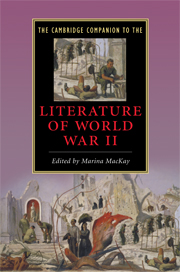7 - The German war
from Part II - Global perspectives
Published online by Cambridge University Press: 28 May 2009
Summary
The most destructive war in Western historical memory, World War II was also the first to target large civilian populations strategically and explicitly erase the distinction between combatants and non-combatants. In the 1930s, partly in reaction to trench warfare in the Great War and technological developments in the interwar years, air war had become increasingly attractive to the Royal Air Force. By the spring of 1942 Churchill was offering Stalin “total air war” as a “second front,” promising to burn down every house in every German city. This promise of total air war was largely kept, and it would dramatically change the Allies' views of the sustainability of hyper-technological warfare, physical, psychological, and moral. Acceptance of “total,” “moral,” “strategic” war in the air meant that there would be no difference between soldiers fighting the enemy at the front and women and children at home awaiting the enemy's bombs, who, paradoxically, had lost their civilian status because they had been turned into the bombs' targets. Utterly helpless in the hyper-sentient fear of being sucked up and consumed by huge storms of fire, they were passive victims of the mass killing of air war that left only the insentient matter of rubble and ashes. In an intelligent world, this massive-scale targeting and killing of enemy civilians might never have happened again. But the Allies, particularly the Americans, focused exclusively on the “good, clean, just war we won” against Germany and Japan, and their unconditional victory would spawn more wars and war-like invasions employing ever more sophisticated deadly weapons that would kill and maim ever more civilians because they could be targeted at any time, from anywhere on the earth and in the sky.
- Type
- Chapter
- Information
- The Cambridge Companion to the Literature of World War II , pp. 98 - 110Publisher: Cambridge University PressPrint publication year: 2009

